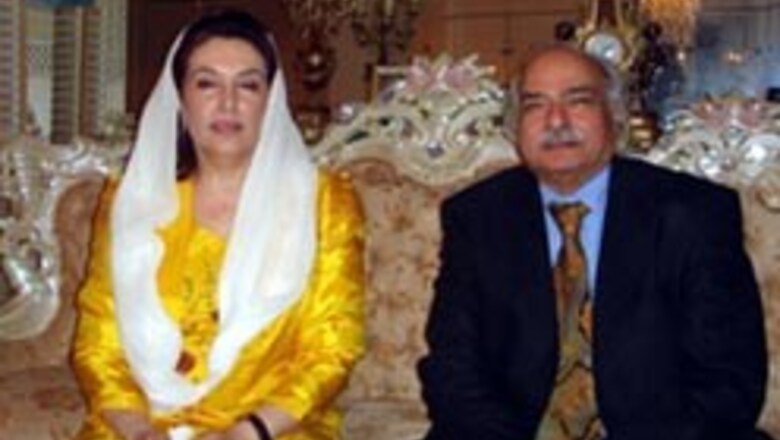
views
The author of the article, Wajid Shamsul Hasan is close friend of PPP Co-Chairman, Asif Ali Zardari and late Pakistan prime minister, Benazir Bhutto. He was a former UK ambassador from Pakistan and has also written Benazir Bhutto's last will. The views and ideas expressed in this article are entirely his own.
Prime minister Zulfikar Ali Bhutto was executed in the dark of the night and rushed for burial to Garhi Khuda Bux in a C-130 as much secretly as professional thieves shroud their prize catch while transporting it to safety. The killers headed by General Zia and his Praetorian gang of usurpers and the four judges of the Supreme Court did not know that the man they thought they had physically eliminated would continue to rule the hearts and minds of his people from his grave until the end of the world.
This has been amply manifested time and again on his birth and death anniversaries when hundreds and thousands from all over Pakistan flock to Garhi Khuda Bux to pay their tributes to the man who lived and died for them.
On his 29th death anniversary this year it was much more than that. Lying besides her father are the last remains of the martyred Benazir Bhutto who died carrying forward the mission of ZAB - the empowerment of the people, supremacy of the constitution and Parliament.
How can I forget the prophetic words - to that effect - in The Guardian(London) obituary on ZAB - the man is dead but he shall rule from his grave for ever and ever.
And there could not be more shameful historic irony for his killer Zia that Bhutto’s name continues to be on the lips of every Pakistan as the national hero and the bravest of hearts - nobody remembers the military dictator nor his gang.
And his mausoleum known as Jabra Chowk has become a glorified rest room for the bus drivers who break their journey to wash and relieve themselves. The recent unanimous election of Prime Minister Syed Yusuf Raza Gilani is no doubt recognition of Mohtarma Benazir Bhutto’s sacrifice in blood for the restoration of democracy and the supremacy of Parliament.
And we would not have travelled that far had our path to the glory had not been strewn with the blood of Shaheed Zulfikar Ali Bhutto as well.
Both father and his dearest daughter gave the supreme sacrifice for the empowerment of the people - especially the women and the minorities.
SZAB by his populist politics and establishment of the PPP - unshackled the chained masses, gave them a strong voice and self-respect hitherto denied to them by the establishment.
His services for the toiling masses have endeared him with the successive generations of the poor. His vote bank has remained in tact despite the worst possible oppression, persecution and prosecution of his followers.
His daughter picked up the pieces from where he left in 1979. Martyred Benazir Bhutto put the entire nation onto a transformation course.
She gave the nation renewed hope and confidence in the destiny of Pakistan. She could have launched an armed struggle to get rid of Zia following Bhutto Sahib’s execution and stormed the GHQ on her tumultuous return in April 1986 with millions in the streets.
PAGE_BREAK
Yet she preferred to establish supreme power of the vote against the barrel of the gun. Indeed, her father gave voice to the muted majority, gave them self-respect and by walking to the gallows, head high, instilled in them the spirit of defiance never to bow to a usurper.
Ms Bhutto, by laying down her life the way she did, made death look small before her. Her lasting contribution - from where there would not be a turning back - is to make the people and parliament the sole arbiter of power. Now the people will not let any usurper get away with it.
Mr Gilani’s reassurance that there would be no compromise on the supremacy of Parliament is the best tribute to her supreme sacrifice and the struggle her father waged.
The military-civil-judicial troika backed by the vested interest did not allow SZAB or his daughter to complete their missions. She single-handedly overcame all hurdles put in her way and took on her opponents - mobilising the masses from within and networking with leaders and think tanks abroad - to defeat the anti-people ruler at his own game.
She was staunchly supported by the fathomless perseverance of her supporters in the masses, poor PPP workers and the dauntless determination of persons like her husband Senator Asif Ali Zardari (11 years in detention), Syed Yousuf Raza Gilani (over five years in prison) and many others who braved long periods of incarcerations - shunning all offers of pelf and power.
The machinations of the known enemies and their quislings within could not destroy SZAB’s or Bibi’s steeled determination to challenge the dictator.
I must put it on record that there was no deal whatsoever with him. The negotiations were aimed at doffing his military uniform, holding of free and fair elections at the earliest under an independent election commission, restoration of the 1973 Constitution, doing away of the 17th Amendment, independence of the judiciary and the media, return of all political leaders in exile and their participation in elections, doing away of the third-time condition limiting the election of the prime minister and quashing of all politically motivated cases.
And not to create any hindrances in the return of leaders in exile. The November 3 imposition of the state of emergency pushed everything back to square one.
Llife in Pakistan has never been the same again following the judicial murder of Shaheed Zulfikar Ali Bhutto by General Ziaul Haq (April 4, 1979).
What followed was nearly three decades of unease, ethnicity, divisiveness, sectarianism, heroin and Kalashnikov culture, rise of religious extremism and an on going war between the military establishment and the unarmed people - the former insisting that it is its right to rule with the barrel of the gun and the latter seeking the supremacy of the vote as the sole arbiter of power.
PAGE_BREAK
The recent triumph of vote is a tribute to SZAB and SMBB’s populist politics devoted to the greatest good of the largest number.
No student of history or politics can forecast how long this struggle shall continue. However, despite colossal setbacks the noble blood of Bhutto’s daughter Benazir has rejuvenated the flame of freedom and democracy lit by SZAB and the nation is on the way to complete transition to democracy towards fulfilling their democratic dream.
Dictatorship has rendered Pakistan into a great hub of duplicity, converted it into a nation of confounding murkiness and transformed its once peaceful land into an epicentre of international terrorism.
More than half of Pakistan’s sixty years have been wasted under direct military rule while rest could not be entirely productively beneficial for the nation since the endeavours of civilian rulers were stinted by the establishment’s behind-the-scene machinations. Pakistan until lately has been described as a country "where every kind of deception, collusion and outright sham are recurring motifs in the political theatre" forecasting fate of yet another Yugoslavia in the making.
It was a no-survival situation after the creation of Bangladesh. Had we not had SZAB to steer the sinking ship out of the stormy ocean, Pakistan would have been rendered a footnote in history. SZAB not only picked up the pieces but he also soldered them into a new nation binding them with a constitution that continues to be the proverbial glue keeping the country and its people together despite the extra-constitutional interventions.
SZAB’s advent in politics was a turning point in Pakistan’s history. He was the youngest minister with ideas in a government headed by Ayub Khan who had generals and senior bureaucrats in cahoots to put their claim to power as the legal heirs to the British Raj replacing the civilian politicians. As opposed to them Bhutto was driven by his romance with democracy and freedom for the people as envisaged by the Quaid. Having found a place for himself on a platform that was not favourable to politicians, Bhutto chartered himself on a course that would give a new sense of direction to the country and a fresh meaning to politics.
As a major player by his own right, SZAB made a tremendous impact all around in no time. As Minister for Fuel and Power, he had diverse explorers tapping into Pakistan’s underground hidden energy resources. As Minister for Science and Technology he set Pakistan onto the path to match India’s advancements in the nuclear technology.
And had he had his way Pakistan would have acquired nuclear capability much before India tested its atomic device in 1974. However, when destiny put him in a position where he could convert his dream into a reality, he wasted no time and gave Pakistan its nuclear glow at the cost of his life.
SZAB had an extra-ordinary penchant for international politics. He freed Pakistan from being tied with the apron strings of the West. Pakistan’s independence was rendered into a myth by Ayub (as is the case now).
Ayub had made Pakistan a country ‘East of Suez' where forces of the free world could land at any moment and he also offered to India joint defence against what he called common enemy from the north just when Chinese Premier Zhou En-Lai had proffered Kashmir on a plate to Pakistan.
By his statesmanship SZAB salvaged Pakistan’s independence by consolidating relations with China, European nations and the Third World. And the Islamic Summit that he held in Lahore remains to this day unsurpassed in glory and substance it achieved.
SZAB was hurt most not by the treatment meted out to him by Zia and his gang. He was abysmally grieved since they had taken Pakistan back to 1947. “In the process they have robbed the nation of the high ideals and spirit of fraternity the people shared and demonstrated in 1947.”
His daughter Benazir Bhutto gave her life to re-launch a revived and democratic Pakistan where religion will have nothing to do with the business of the state and where every citizen will be an equal Pakistani. It is now incumbent upon the nation and its political leadership to carry forward the torch of democratic freedom ignited by the Bhuttos with their pristine blood.
There should not be any compromise on the supremacy of Parliament, rule of law, independence of judiciary and media. The nation must learn to stand behind institutions rather than individuals. Similarly national issues and objectives should have preference over individual interest - whatever their nature.




















Comments
0 comment